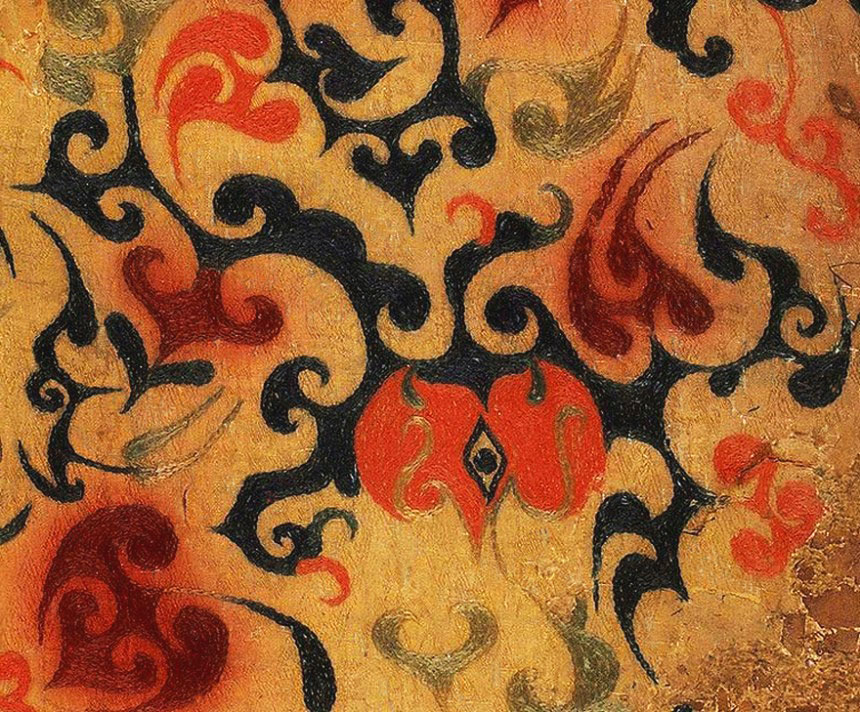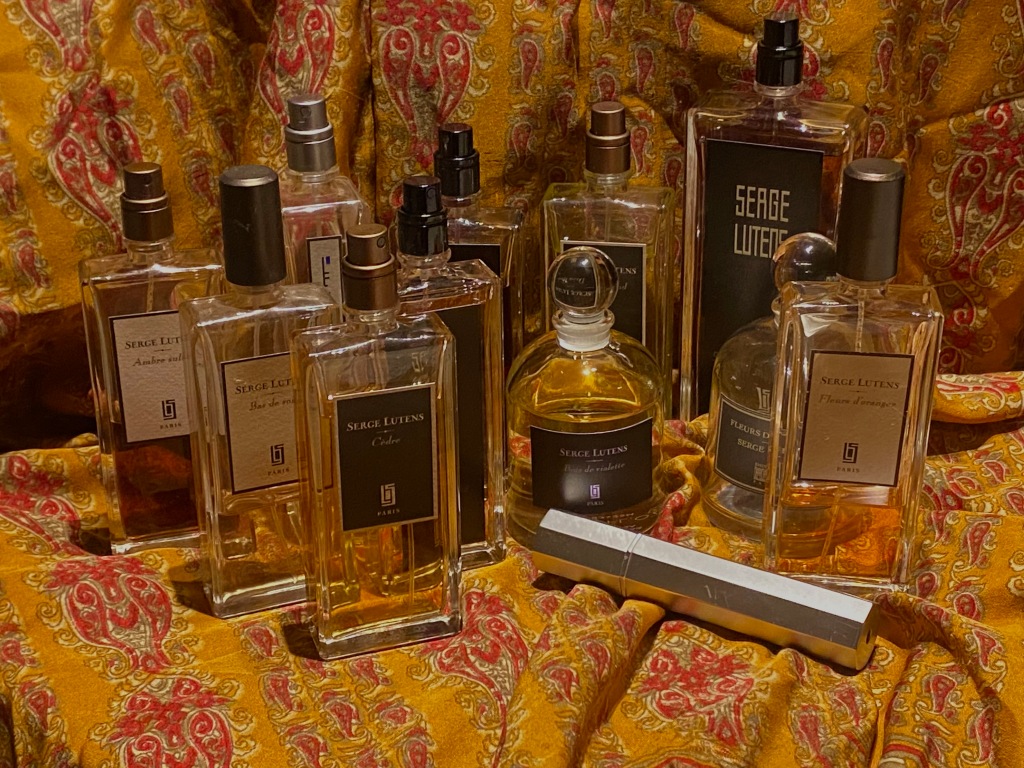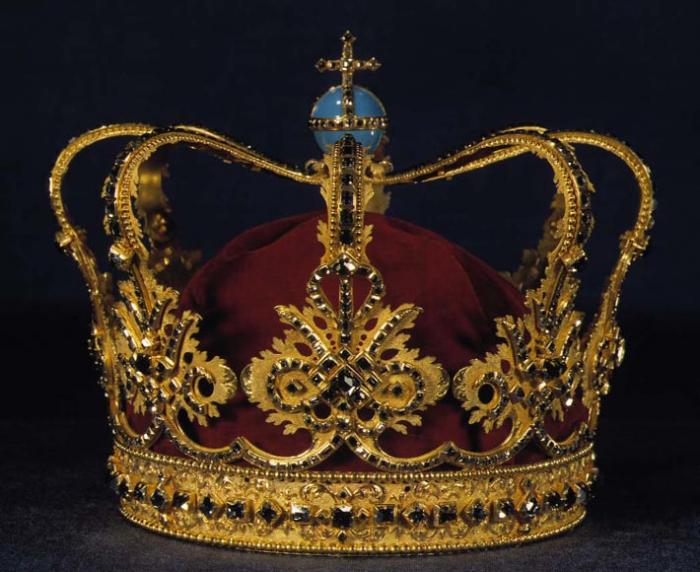
– a time-travel tale – and a review – of Serge Lutens Mandarine Mandarin
Chang’An, 682 CE
It was the day before Zhang Hou New Year, which meant that Aristaios should be packing up his belongings at the inn to join the caravans bound for the long journey to Samarkand and beyond. With a little luck, he could be in Kashgar by spring, more luck, and he would be home in his native Constantinople by next winter, to sell his wares, to finally marry, to carry on his storied line of Byzantine traders, and to remain until the next time he came to fabled Chang’An, if he ever did.
But Aristaios found himself reluctant to return. Why go back to Constantinople, when everything and anything he could possibly desire could be found here at the edge of the world, in a city of splendor and plenty not even the pearl of the Bosporus could ever hope to equal?
The rod-straight boulevards that stretched to the horizon, the palaces of the emperor Gaozong, the pagodas of worship, the parks with their canals, their lakes and fountains, their pavilions and tea houses, the Persian bazaars that sold anything and everything his own world had to offer, and many things not even his own emperor Constantine had ever seen. Silks worthy of any pagan God or Christian emperor, silks in glorious, embroidered colors seen only in fever dreams, medicines to cure all and any aches and pains, perfumes to set both man and beast alight, infinitely finer by far than anything upstart Damascus could hope to make.
Not even in Byzantium could a man travel in safety from brigands and thieves, or sleep in spotless, comfortable inns, knowing his camels were fed, and his wallet and his wares secure.
In Chang’An, all these things were possible, and endless more beside. Why should he ever leave?
He knew the answer. His father would haunt his dreams all his life if he remained. Bad enough, but far worse was to know the beautiful Helena, whose image in his mind had haunted him all along the long, long road to Chang’An. Through the desiccated roads of Persia, the scorching sun of Samarkand, and all through the endless, deadly, shimmering sands of the Taklimakan that stretched from Kashgar to Duahuang, he had been haunted by Helena’s laughing face. Indeed, she was the reason he was present in Zhang Hou, here in the beating heart of Chang’An.
“Go to Chang’An, my son, since you are by far the best Persian speaker among us, and when you return, you shall marry Helena.”
Marry Helena! All doors would be open when he married Helena, the trading company could grow, the family fortune swell. He cared for none of it, cared for nothing but to see that laughing face under the olive trees in the garden by the Bosporus. If not for Helena, he would stay here in Chang’An, the center of a world far more refined than Constantinople. But Helena.
The drums heralding the opening of the Persian bazaar at noon startled him out of his reverie. He would be late for his meeting with the customs official in a teahouse in the bazaar if he did not hurry, his goods might even be fined!
Well enough, he could add the fine to the premium and the taxes when he sold them back home.
In the crush of humanity in the Western bazaar, he was late all the same. Persians and natives, Samarkand Sogdians and Indians, Greeks and Arabs all came to Chang’An, and since it was New Year’s tomorrow, most of them were here, it seemed, eager to stock up before the holiday, eager to share news of the roads, the taxes, the gossip of the court.
“Aristaios? Son of the trader Chrysippos of Constantinople?” Flawless Persian, with no trace of accent. A tall figure dressed in the distinctive headdress and orange silks of the court officials rose and bowed before him. Orange. An official of the fourth rank, well-used to dealing with foreigners and traders.
The courtesy surprised him when he finally arrived at the teahouse out of breath. He bowed low in return. Protocol was everything in Zhang Hou. “I am.”
“I am Wu Liu, of the Office of Trade, to see that your export papers are in order and your fees have been paid in full.” Wu Liu was young, close to his own age. This meant that he had only recently passed his exams.
Aristaios dug in his tunic for his papers. “I do believe they are in order, lord.”
Wu Liu twitched a corner of his mouth. “Chrysippos is known in Chang’An as an honest man.” He quickly perused the sheaf of papers bearing Imperial stamps and signatures.
“Thank you. The Emperor Gaozong is known to be fair to merchants.”
“Or his officials are. If you’re lucky! You might be.” Wu Liu laughed. “Tea?”
Yes, the addictive drink that was everywhere along the Great Roads. Tea.
“So, do you have everything you need for your return?” asked Wu Liu, once the tea steamed in the cups.
“Most of it,” he replied. The bales of silk and spices in the warehouse by the Western Gate, the ceramics wrapped in wool and straw in their crates, a necklace, a jeweled comb for Helena stashed away in his saddle bag. “But do you know where I might find a perfume for my betrothed? Not the ones sold here in the bazaar. I can buy those cheaper in Merv or Rhagae. Something finer, something unique to Chang’An.”
The silks rustled as Wu Liu shifted in his seat. He smiled wider. “Something only a customs official would know to find, perhaps?”
Aristaios sipped his tea. “If it’s not an impertinent question.”
At that, Wu Liu laughed. “It is always an impertinent question. For your betrothed, you say? Ah. I know the one. You are searching for a perfume of marriage, something unique. Have you ever heard of the Fenghuang? Or the dragons of Zhang Hou?”
“The dragons of Zhang Hou?” he bleated. “The monsters of myth?”
“Just so, in Byzantium. But in Zhang Hou, dragons are portents only of good. They bring good fortune and prosperity to those who honor them. And the Fenghuang…” Wu Liu paused and considered. “A phoenix, I believe you call it. A symbol of virtue and grace. The dragon and the phoenix together are symbols of a happy union, man and woman, light and dark. There is a Frank with a perfume shop close by the Serpentine River park. Are you familiar with the park?”
“A Frank? In Chang’An?” This surprised Aristaios. The Franks were, for all he knew and practical purposes at the opposite end of the world.
“The world comes to Chang’An, Aristaios. Even a Frank.” Wu Liu rose to his feet. “I must return to the office. Go to the Frank, and ask for The Phoenix and the Dragon. Tell him I sent you. He speaks Greek. He will know.” Another bow, and Wu Liu was instantly swallowed by the crowds in a glimmer of orange.
The winter sun slanted westward by the time Aristaios found the shop near the Serpentine River park, exactly where Wu Liu had said it would be. The shop was plain and unassuming, nothing more exciting than apothecary jars in their cases, mortars and pestles, a long counter for the customers and two orange trees by the door. Yet the Frank himself, a spare, unassuming old man with a guarded manner, was the biggest surprise of all. For the first time in over a year, Aristaios spoke his native Greek. In Chang’An! At the end of the world!
“Wu Liu, you say? Ah – a good man. They say he has great things in store in his future. But you are busy, I can tell …” and he shuffled off to the back of the store. “It is very expensive, you know, the Dragon and the Phoenix. But very auspicious! Best for marriages! Yes, now where did I …”
Another moment, and Aristaios stared at a black, lacquered tiny box of wax, embossed with what he supposed was a phoenix and a dragon in red lacquer.
“Here,” the Frank found him a stool. “Sit. My perfumes are better experienced so.” He opened the box, touched the wax, and transferred it to Aristaios’ wrist. “Breathe it in.”
So he did. The next instant, he was glad to be sitting down, for this!
This! This was the scent of happiness and sunshine, of wintery joys and cosy nights by a fire, of the orange so loved in Chang’An at New Year’s. Spice and the lacquered box it came in, celestial flowers perfumed with blinding divine light, of tea in a teahouse and glimmers of silk, of all the wonders of Chang’An and all the happiness he hoped would come, this was not a perfume, this was an epiphany!
Take that, you piddling, mediocre perfumers of Damascus!
“You like it?” asked the Frank.
Aristaios moved his mouth, but no words would come out. “Um, I …” he faltered. “Can I steal it? All of it you have?”
“No. The Phoenix and the Dragon can be bought. Or given. That is all.”
He fumbled for his pouch of gold coins and dumped them all on the counter. “Will this be enough?”
The Frank didn’t blink. “No.” He removed one coin. “Keep the rest.” He wrapped the tiny box in a square of embroidered orange silk and tied it with an elaborate gold cord..
As Aristaios rose and turned to leave, the Frank called after him. “I hope she’s worth it. Or you are!”
Many months later in Antioch, Aristaios dug in his saddlebags for a clean tunic at the inn. Home was mere days away, home, and Father and Helena of the laughing face. Near the bottom, he found a large, square package wrapped in orange silk he certainly didn’t recall stashing away. He untied the silk. A large, lacquered box he also didn’t remember, embossed with a red, lacquered phoenix and dragon and on top of it, a scrap of Zhang Hou paper.
In careful letters, it said in Greek:
The phoenix and the dragon can only be bought, or given. Choose wisely.
Notes: Chinese orange, nutmeg, orange peel, mandarin orange, tea, amber, labdanum, tonka bean, rose hip.
Mandarine Mandarin is a Palais Royal bell jar exclusive, available directly from the Serge Lutens website.
With thanks to Molly, who reminded me.
Photo: Embroidered silk from the Mawangdui tomb of the Lady of Dai, Hunan Province, Western Han dynasty, ca. 182 BCE. Digital restoration and enhancement, yours truly.




